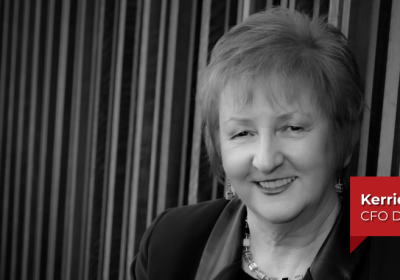
- Author: Emma Foster
- Posted: June 2, 2024
Blending Profits & Purpose > Jean-Baptiste Naudet, CFO, Australian Red Cross
After two decades with blue-chip multinationals, Jean-Baptiste Naudet’s career has taken a new direction, stepping into the not-for-profit sector, and he’s discovered many for-profit professionals underestimate the sector’s complexities.
Finance leader Jean-Baptiste Naudet has never been shy of stepping into unfamiliar territory to broaden his experiences throughout his 25-year career.
His professional adventurousness has seen him garner experience in an eclectic mix of industries with renowned blue-chip multinationals including French defence group Thales, US beverage maker Coca Cola, Australian travel agency Flight Centre and US med-tech and pharma firm Johnson & Johnson.
“Your career is not a straight line – it’s a lattice,” says Naudet, who made his most recent sectoral shift in 2020, stepping beyond the world of big corporates. He elected to apply his two-decades’ of commercial experience to the not-for-profit sector, becoming CFO of charitable society St Vincent de Paul, known as “Vinnies”, before taking up his current role as CFO of humanitarian organisation Australian Red Cross.
“I’ve always been attracted to roles where I feel I can add value and also where I can learn,” he says. “You’re always picking up new experiences – both good and bad – and that builds you up so you can get those bigger roles and have more impact.”
A Sense of Purpose
The French-born Naudet, who made Sydney his home in 1999 after transferring here during his five years with Thales, had never envisaged shifting into non-profits. The spark was lit during his 10 years with Johnson & Johnson, where he began as a financial controller in its $700 million medical device division, with a team of 25 people.
“One thing I really loved about Johnson & Johnson was its sense of purpose,” he recalls.
Although previous employers had set out clear missions, he says he was “quite touched” by Johnson & Johnson’s ethos to “profoundly change the trajectory of health for humanity” and its founding credo to “put the needs and well-being of the people it serves first”.
“J&J had a consultative and non-confrontational culture, with a strong purpose, and it made me realise that was the type of culture I wanted for my next role, regardless of whether it was for-profit or not-for-profit.”
When an opening arose for CFO at Vinnies NSW – a charitable society with revenue of more than $200 million that supports people experiencing poverty – he saw the opportunity as offering “purpose on steroids”, while also meeting his criteria of somewhere he could add value and learn.
“It was a big role, with a team of 100, covering IT, property, procurement, payroll and finance,” he says. “They also had issues: They’d been losing $20 million a year, which had to be turned around, and the internal processes were seriously outdated – they were still using Excel for reporting, had no financial tools except for an old ERP, nor any business case processes or templates.”
Naudet quickly set to work on his remit to lift the finance capability, applying his commercial acumen to the organisation which has around 3,900 members, 7,500 volunteers, 1,300 employees and 220 stores, and supported almost 90,000 people in need last year across NSW. He put in a new reporting and budgeting tool, a new business case template and process and built a robust budget – all of which helped get the organisation back to surplus.
While Naudet concedes there were times of frustration at the pace of change able to be absorbed by Vinnies due to legacy systems and the incredibly tight margins which are well below the corporate sector, he was also awestruck by the passion of the people.
“I’ve met absolutely amazing people that have dedicated their lives to helping others,” he says. “Among the unpaid members and volunteers, I’ve met some who have been working four days a week, every week, for 30 years – it’s unbelievable and so very humbling. They do it just for the love of what they give back to the people they assist.”
Having achieved the turnaround at Vinnies, last September Naudet took on a new challenge as CFO of national humanitarian organisation, the Australian Red Cross.
“Australian Red Cross is not just another charity,” he says. “Our Patron is His Excellency the Governor General, and we have a very special place as being auxiliary to government but funded through the generosity of the Australian public, combined with our amazing brand.”
In 2023, the organisation, with more than 1,600 employees, mobilised 18,450 members and volunteers for a range of activities, such as providing support to 324,000 people affected by natural disasters, delivering 153,000 meals to older people, and distributing 7,788 tonnes of humanitarian aid across the globe.
But, like Vinnies, Naudet has been confronted with similar challenges: the need to turn the finances around from last year’s deficit of $27 million to a surplus, and to put in place more robust financial processes and systems to support a large organisational restructure kicked off last year by the former CEO, Kym Pfitzner, who sadly passed away just a month after Naudet commenced.
Naudet had been impressed by Pfitzner’s “inspirational leadership” and the tough decisions he’s taken in the past year, including a narrowed focus for activities and big investments in technologies and systems to improve efficiencies, which are being rolled out as the search for a new CEO progresses. He enthuses that the pace of delivery has been frantic.
“The scale of the organisational redesign and the tech investment, including putting in an ERP, CRM and HR system at the same time, it’s been crazy, but it will turn things around,” he says.
“I am really enjoying being in that fixing phase, hiring some great people and building the capability we need in the team and across the organisation. At the end of the day, we’re here to deliver impact, but in an efficient way, with commercial savviness, so we can be financially sustainable.”
Having ventured from corporates to the non-profit sector, Naudet has discovered that many executives in for-profit organisations may underestimate the level of complexity in non-profits.
“I’ve worked in some highly complex corporations, but the non-profits are more complex,” he says.
“If you think about a fast moving consumer goods (FMCG) company, they really do one thing: manufacture and distribute products. Sure, there are intricacies, but it’s one thing. Same with a company like Flight Centre: it is a retailer of travel. But here, at Australian Red Cross, we are a retailer, an RTO providing first aid and mental health training, we offer emergency, aged care and homelessness services, we assist refugees and people impacted by people trafficking, we provide advice on International Humanitarian Law. Being an expert across all those areas, rather than one, feels more complex.”
Naudet is excited by the challenges ahead at Australian Red Cross and the sense of satisfaction he feels by adding value to an organisation that does so much good, but he hasn’t ruled out a return to the corporate sector.
“I love the sense of purpose here, and I also felt that sense of purpose when I worked in the healthcare sector,” he says.
“The future for me is purpose, whether I go back in a profit-making business or stay with not-for-profits.”








